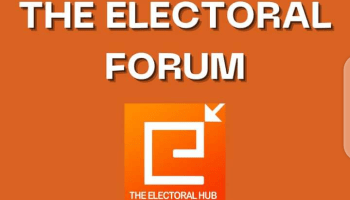By Chimezie Godfrey
The Electoral Forum, an initiative of the Electoral Hub, has advocated for urgent judicial reform to ensure that court rulings and judgments do not jeopardize Nigeria’s democracy.
Chairman of the Forum, Professor Adebayo Olukoshi disclosed this as part of the recommendations made during the Forum’s Eighth Technical Session held recently.
Olukoshi noted that current trends in the political system were multitasking and required multi-stakeholder engagement.
He said these trends includes fuel scarcity, the newly redesigned currency, concerns about adequate training of ad hoc staff to correctly record and upload accreditation details, and the BVAs in light of the recent Osun governorship judgement which nullified the election due to overvoting, and the allocation of BVAs based on number of PVCs collected.
He said considering the recent Supreme Court decisions, the Forum believed that the judiciary must be called to account to ensure that their rulings and judgments do not jeopardize the country’s electoral system.
He stressed that election-related issues should not be resolved on a technical basis, and that if elections are found to be invalid, reruns should be held to ensure that electoral outcomes are solely the result of popular vote, adding that this would engender confidence and prevent people from losing faith in the electoral process.
Olukoshi who expressed concern about the impact of the Supreme Court judgment on the electoral process and its negative impact on the perception of many Nigerians about the electoral process, called for urgent judicial reform.
He said,”Given the foregoing, The Electoral Forum hereby made the following recommendations: Judicial decisions on elections should prioritize substance over technicalities to ensure that justice is not perverted on the basis of technicalities and that people do not lose faith in the judiciary as the last hope of the common man.
“As they did with INEC and security, which led to improvements in election management in Nigeria, civil society organizations (CSOs) should now focus on engagement with the judiciary to facilitate wholesome reform. Recent improvements in the conduct of security agencies in elections, as seen in the governorship elections in Osun and Ekiti, also reflect this trend.
“To prepare judicial officers for future elections, civil society organizations should work with the National Judicial Institute.
“One of the lessons from the Supreme Court decision is that INEC should promptly publish political party monitoring reports and make them publicly available as a way to deter those looking to influence legal proceedings and those who might want to take advantage of technicalities to thwart justice and fairness in the electoral process.
“Technicalities in electoral Court decisions should be well described to avoid misunderstandings and foster a greater awareness of these topics, particularly among the electorate.
“Recent events highlight the urgent need for legal system reform and a reassessment of our laws and their application. There is the immediate need for the Federal High Court to review its Practice Direction, particularly on the mode of commencement of pre-election cases using originating summons.
“There is a need to enlighten and educate voters and stakeholders on the process of electing people and declaration of results to prevent violence due to ignorance.”
Olukoshi added that INEC needs to activate its rapid response communication system in relation to false news to ensure that the public has quick access to accurate information and prevent hackers from tampering with results from the INEC Result Viewing webpage (IReV).
Concerning anticipated and unanticipated risks, he identified ten threats to the 2023 general elections as follows: security, trust deficit, judiciary , infrastructure, tight presidential race, voters’ access and voting rights, electoral technology, internal sabotage within the EMB, vote trading, and rising youth expectations in the electoral process, as evidenced by how youths are mobilizing for the election.
He also stressed the importance of considering the high cost of elections from both the budgetary allocation to INEC and how it may affect election preparations, as well as the costs incurred by various electoral stakeholders, including legitimate logistical costs incurred by candidates and political parties during electioneering and on election days.
The Forum is urging all stakeholders in the electoral process to support its push for improved electoral governance in Nigeria.




